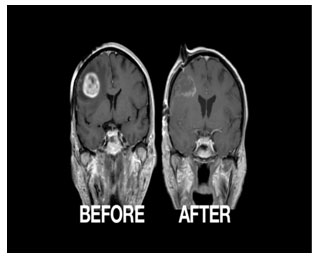
A Brain Tumor is a collection, or mass, of abnormal cells in your brain. Your skull, which encloses your brain, is very rigid. Any growth in such a restricted area can cause problems. Brain tumors can be cancerous (malignant) or noncancerous (benign). When benign or malignant tumors grow, they can cause the pressure inside your skull to increase. It can cause brain damage, and it can be life-threatening.
Brain tumors are categorized as primary or secondary. A primary brain tumor originates in your brain. Many primary brain tumors are benign. A secondary brain tumor, also known as a metastatic brain tumor, occurs when cancer cells spread to your brain from another organ, such as your lung or breast.
Treatments
Surgery
If the brain tumor is detected in a region that makes it handy for the surgery, your surgeon will work to eliminate as much of your brain tumor as possible. In some cases, tumors are small and easy to separate from surrounding brain tissue, which makes the complete surgical removal possible. Sometimes it becomes difficult to separate tumors from surrounding tissue, just because it is located near sensitive areas in your brain, making surgery risky. In these situations, your doctor may try to remove as much of the tumor as is safe. In some cases, only a small biopsy can confirm the diagnosis.
Radio Surgery
Stereotactic radiosurgery (SRS) is not a form of surgery in the traditional sense. Generally, radiosurgery uses various beams of radiation to provide a highly focused form of radiation treatment to destroy the tumor cells in a very small area. Each beam of radiation is not particularly powerful, but the point where all the beams meet — at the brain tumor — receives a very large dose of radiation from killing the tumor cells. Radiosurgery generally completed in one treatment, and in most cases, you can go home the same day.
Radiation Therapy
To kill tumor cells, radiation therapy makes use of high-energy beams, such as X-rays or protons. Radiations come from a machine outside your body (external beam radiation). But in cases, radiation can be placed inside your body close to your brain tumor (brachytherapy). External beam radiation applied to the part of your brain where the tumor is present, or it can also be applied to your entire brain (whole brain radiation). Whole brain radiation also used to treat cancer that has reached to the brain from some other part of the body.
Chemotherapy
It uses drugs to kill tumor cells. The drugs can either taken orally in pill form or injected into a vein (intravenously). The most common type of chemotherapy drug often used to treat brain tumors is temozolomide (Temodar), which is taken as a pill. A large number of other chemotherapy drugs also available and used on the basis of the type of cancer. Another type of chemotherapy also placed during surgery. After removing the whole or some part of the brain tumor, the surgeon may place one or more than one disk-shaped wafers in the area left by the tumor. These wafers then slowly release a chemotherapy drug over the next several days.
 Symptoms
Symptoms
- Obesity
- Confusion or Memory loss
- Sensitivity to heat or cold
- Abnormal nipple discharge
- Loss of balance, coordination
- Absent menstruation (periods)
- Weakness in one part of the body
- Low blood pressure and Eye problems
- Difficulty swallowing, writing or reading
- Changes in the person’s mental function
- Lack of control over the bladder or bowels
- Numbness or tingling on one side of the body
- Headaches, Seizures, Clumsiness and Dizziness
- Personality, mood, behavior, or emotional changes
- Enlarged hands and feet, Excessive body hair and Facial changes
- Change in alertness (including sleepiness, unconsciousness, and coma)
- Trouble speaking or understanding others who are speaking and walking
- Changes in hearing, taste or smell and ability to feel pain, pressure, different temperatures, or other stimuli
Causes
- HIV infection
- Cigarette smoking
- Radiation to the head
- An inherited (genetic) risk
- Environmental toxins (for example, chemicals used in oil refineries, embalming chemicals, rubber industry chemicals)





